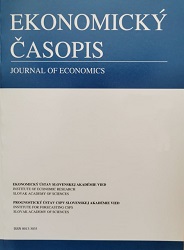Determinants of the FDI Inflow into the Visegrad Countries
Determinants of the FDI Inflow into the Visegrad Countries
Author(s): Ľubomír Darmo, Marcel Novák, Marek Kálovec, Petra RybošováSubject(s): Economic policy, International relations/trade, Economic development, Financial Markets
Published by: SAV - Slovenská akadémia vied - Ekonomický ústav SAV a Prognostický ústav SAV
Keywords: FDI inflow; GDP; labour productivity; openness of economy; Visegrad Group;
Summary/Abstract: The FDI inflow represents an important part of the Visegrad economies. These countries have experienced a high rate of foreign direct investment since the 1990s. However, the flow of investment is different among these countries with a diverse peak of inflow into individual economies. Slovakia, Czechia, Hungary and Poland reformed their political and economic systems and were considered as transition economies. Just like other transition economies, the economic, social and political system of the Visegrad Group countries have some peculiarities. The inflow of foreign direct investment is determined by many factors that might influence the inflow of foreign direct investment positively, but also in a negative way. The paper identifies specific determinants of the inflow of foreign direct investment into the Visegrad Group countries and it assess their impact on the investment inflow. We apply panel regression with the use of standardized variables. Based on the results, we may consider as determinants influencing the FDI inflow into the V4 countries the size of the economy, or its potential, labour productivity, corporate tax, wages, unit labour cost, inflation, education of workforce, openness of the economy, road and railway density, i.e., the quality or development of infrastructure, level of corruption in particular countries and membership of the Economic and Monetary Union.
Journal: Ekonomický časopis
- Issue Year: 68/2020
- Issue No: 10
- Page Range: 1057-1080
- Page Count: 24
- Language: English

